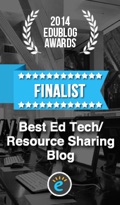7 alternatives to Ted Talk goodness

We all love Ted Talks. You get in. You get out. You walk away smarter. And almost always with smile on your face cause . . . well, they’re just so darn optimistic.
Added bonus? The huge database of Ted Talks give you access to some excellent resources as part of your instructional design. A quick search highlights a wide range of talks on teaching and education. And a list of history related talks. (Use the filter option to narrow down choices in a huge range of other topics as well.)
If you need some sweet ideas about how to use Ted Talks in your class, browse over to this helpful post by Jennifer of the seriously awesome #worldgeochat site. And don’t get me started on the power of TedEd – the Ted Talks tool designed specifically for educators. Start with this list of social studies related TedEd lessons if you need a jumping off point.
But what if, and I’m just saying what if, Ted Talks doesn’t have what you’re looking for? Are there other options out there? Yes. Yes, there are. Start with these seven:
Talks at Google
Of course Google has its own version of Ted Talks. They wanted to “put all of the world’s most influential thinkers, creators, makers, and doers in the same room, so you could hear what they have to say.” So they created Talks at Google. They also organize by category. You’re probably gonna want to start with History.
Big Think
Big Think is more than just videos but start here. “Every idea on Big Think” comes from a network of 2,000 fellows and guest speakers “who comprise the top thinkers and doers from around the globe.” Their editorial team regularly asks them about the most important ideas in their respective fields. More of a business focus but you’ll find some good stuff here if you filter. Start with the Politics and Current Affairs section by clicking the link along the left hand side.
IdeaCity
Think Ted Talks but for Canada – they get together a bunch of interesting people, let them talk, and post the videos. The database isn’t quite as big and some of it obviously has a Canadian focus but it’s a Canadian project so . . . roll with it and learn from our neighbors to the North. I start with their Politics and Activism section but there’s a ton of other topics to browse and search through.
The Moth
Hmmm . . . the Moth is different. In a good way. “The Moth is true stories, told live and without notes. The Moth celebrates the ability of stories to honor both the diversity and commonality of human experience, and to satisfy a vital human need for connection. It seeks to present recognized storytellers among established and emerging writers, performers and artists and to encourage storytelling among communities whose stories often go unheard.”
And they’ve put together some great resources, lesson plans, and tips for educators that can help you support literacy, speaking, and listening in your classrooms.

RSA
Okay. We’ve got Ted Talks in the US. IdeaCity in Canada. And the Royal Society for the encouragement of Arts, Manufactures and Commerce in Great Britain. They believe that “all human beings have creative capacities that, when understood and supported, can be mobilised to deliver a 21st century enlightenment.” You have to love that level of optimism and it shines through in their work. You may have seen this RSA animated video of a Ken Robinson talk. So be sure to check out the different animated, short, and public events video clips.
Creative Mornings
A few years, a couple of New York City folks decided to start getting together once a month on a Friday for breakfast and a short talk – billing it as a “breakfast lecture series for the creative community.” Just a way to drink some coffee, exchange some ideas, and spread the creativity. It’s bigger now. And that’s a good thing for us. Start with the Education videos and then browse your way through the whole list.
Pecha Kucha
This one may take some getting used to. It was big a few years ago and is still hanging around cause it’s cool and quick. Basic idea? Speakers create a slide deck of 20 slides. During the presentation, the slides advance automatically every 20 seconds. So . . . as a presenter, the ideas have to be focused and clear.
Seems . . . a little odd but it has caught on around the world. It’s a great way to get some new ideas, use as writing or discussion prompts with students, and is a great presentation rubric to use with your kids. It’s a bit harder to find things here but using the simple search tool can usually get you some useful results.
Have fun!
















Hey, thank you for sharing this! Most of these alternatives I’ve never heard of before so I’ll have to check them out!
You’re welcome! But be careful – they’re just like Ted Talks. Once you’re in, it’s tough to dig your out of all the great stuff you’ll find. 😉
have fun!
glennw
Noted. I was glad to see a Canadian source on here- we often get overlooked up here in the North and some ELA and SS outcomes are dependent on listening to specifically Canadian sources.
Love IdeaCity! Great stuff.
Thanks for the comment!
glennw